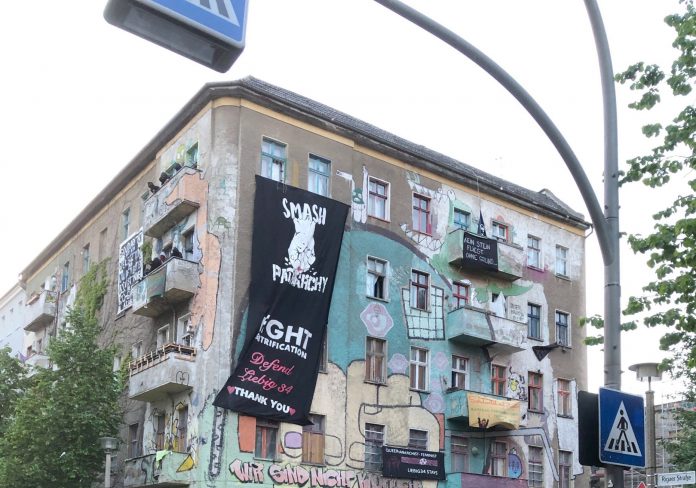(THIS ARTICLE IS MACHINE TRANSLATED by Google from Norwegian)
About. 6000 protesters gathered before the train set off just to Rigaer Strasse, where anarchist house occupants had occupied several apartment blocks. A large part of Rigaer Strasse had been shut down for the past two years. The demonstration was aimed mainly at the real estate investor Christoph Groener, which has invested in the development of new rental apartments in the street. According to the shop owners in the street, the district has in recent years changed gravely: Almost all old people have moved from there. They can no longer afford increased and therefore too expensive rents.
At Wismar Square, MODERN TIMES, among many other anarchist groups, met a fellow from the FAU (the Free Workers 'and Workers' Union) who distributed the newspaper DA (Direct Action), the anarchist-syndicalist newspaper for FAU. What does FAU stand for?
FAU
FAU is an association of local basic associations. IN FAU (be) vote the members of the grassroots in general meetings over all important decisions. FAU has no salaried salaried employees, but secretaries elected by all members. These can be freely replaced by members. Any decision from the bottom upwards in the association is determined by the members themselves. FAU understands itself as a separate organization for all wage earners, including students, students, pensioners and the unemployed.
The FAU disregards cooperation and partnerships between trade unions, employers' associations and the state, as they represent an anti-authoritarian and anti-hierarchical line. They are completely independent of parties, government institutions and non-governmental organizations.
FAU regards LO as too weak.
The organisation's credo is that if all wage earners freely join together, it will be possible to build a power base that can have an impact on the union's demands by means of direct labor struggles and actions. FAU will establish business groups that are independent of the DGB (Deutscher Gewerkschaftsbund, corresponding to the Norwegian LO, ed.) And of the corporate council. FAU regards LO as too weak. In collaboration with business unions, the business groups will develop and implement their own strategies for improving and developing the workers' living and working conditions at all workplaces.
Instead of exploitation, destruction, oppression of people and nature, the FAU stands for an industrial and social order that promotes solidarity and self-management where all people have the opportunity to live a good life.
Migrant workers
A concrete example of how the FAU engages in the everyday lives of workers and migrants could be read in the newspaper Direct Action: In a court battle in the eastern German city of Jena in Weimar, the FAU supported several female Portuguese workers employed in gastronomy companies to the Giancarlo group . Despite complaints and protests, the foreign workers lost the case.
All decisions from the bottom upwards in the association are determined by the members themselves.
The crux of the matter was that a female employee was fired because there was disagreement about the working conditions. Together with the FAU, she complained by referring to a law against termination, as well as organizing a protest campaign in front of Giancarlo's shops and restaurants. However, in the employment law settlement law, the boss presented a signed employment contract with mutual notice. The female employee refused to sign the contract, but was unsuccessful.
FAU commented that the business owners establish unfair working conditions with full deliberation. Employees in the Giancarlo group are recruited overseas and forced to live in employers' rental homes – where they can be evicted at any time. And the bosses also have unlimited access. Several employees confirmed to the FAU that they were forced to sign documents without understanding German and without the documents being translated in advance. Disorganized workers are without a chance in a legal situation, even though they basically have the law on their side.
Workers must organize themselves independently of the state's courts and institutions – well in advance of labor disputes.
Also read mainly: House occupation and grassroots anarchism


